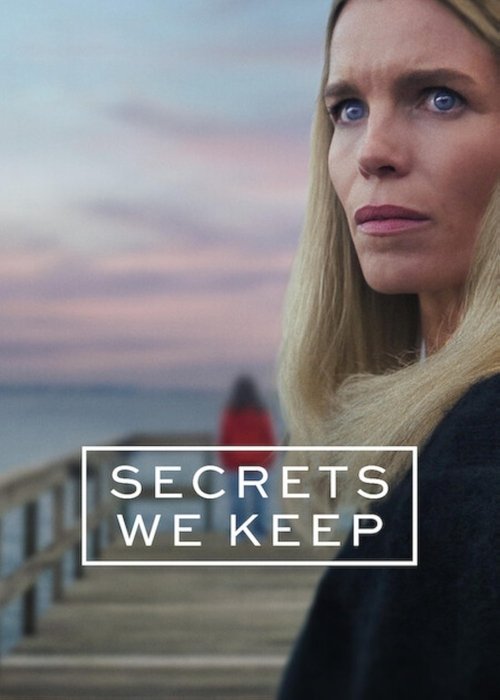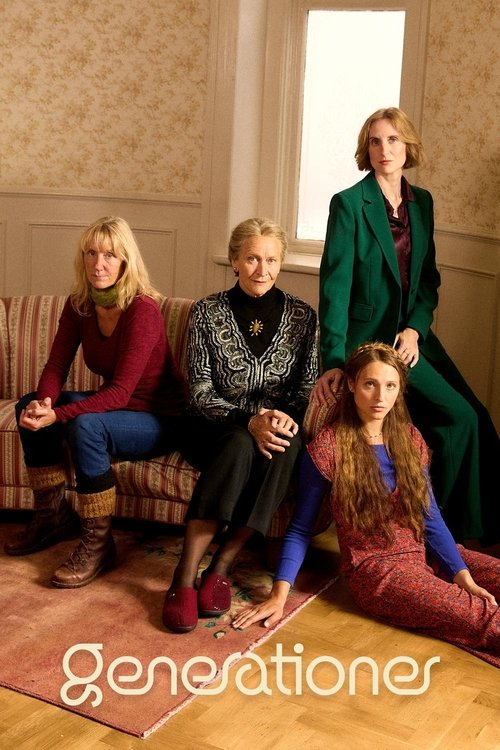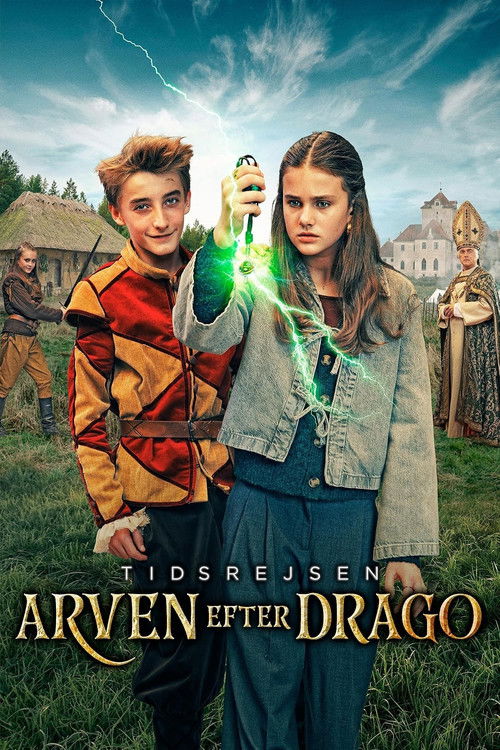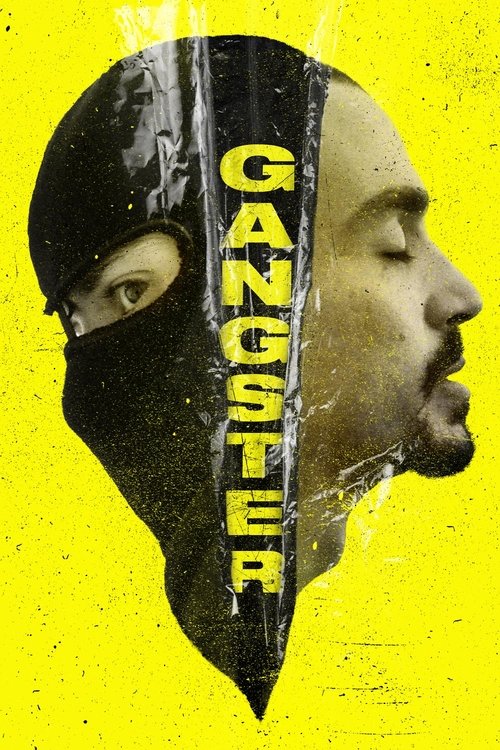
Ask Your Own Question
What is the plot?
The body of a woman is discovered floating lifeless in a swimming pool; she is identified as the leader of a municipal care team on Vestegnen, Denmark. The police begin an investigation, but the focus quickly shifts to the daily lives and interpersonal conflicts of the home care workers who knew her.
Sille, a young woman on welfare benefits, is assigned to mandatory job activation in the home care sector. She resents the assignment, as she would rather spend time with her mother at a beauty salon, and initially plans to act incompetent to avoid real work. However, Sille is unexpectedly skilled at caregiving, which surprises both herself and her colleagues. She is placed under the supervision of Rie, an experienced but emotionally exhausted social and health care assistant. Rie is preoccupied with her own career concerns, hoping for a promotion to team leader, which would allow her to avoid being placed in a municipal resource program for burnt-out employees.
Rie's boss, Patrick, is ambitious and manipulative. He abuses prescription medication and has inappropriate relationships with younger female assistants on his team. Rie knows about Patrick's behavior but chooses to help him make a good impression on higher-ups, believing that his promotion would secure her own advancement. Meanwhile, Rie's personal life is strained: her brother-in-law, who is terminally ill with cancer, is being cared for at home by Rie and her husband, adding to her stress and emotional burden.
Sille's mother is disappointed and unsupportive of her daughter's new role, which leaves Sille feeling isolated. However, Sille finds unexpected comfort and camaraderie with some of her colleagues, despite her initial reluctance to engage with the work. Rie, who has trained many young people before, finds Sille particularly challenging--she views Sille as lazy, spoiled, and overly sensitive, while Sille sees Rie as boring, rigid, and blindly obedient to authority.
As the season progresses, tensions within the team escalate. Patrick struggles to maintain control over his staff, who are increasingly aware of his misconduct. Sille, despite her initial resistance, begins to take pride in her caregiving abilities and forms tentative bonds with some of the elderly clients. Her growing competence and confidence create friction with Rie, who feels threatened by Sille's natural talent and independence.
A key subplot involves Rie's secret dealings with Kim, another team leader. Rie faces a moral dilemma: she becomes aware that Kim poses a potential threat to Sille, but speaking up could jeopardize her own career prospects. Rie's internal conflict intensifies as she weighs her loyalty to her colleagues against her desire for self-preservation. This tension comes to a head when Sille is directly affected by Kim's actions, forcing Rie to decide whether to protect Sille or remain silent to protect herself.
Throughout the season, the mystery of the team leader's death looms in the background, with suspicion and gossip circulating among the staff. The police investigation progresses slowly, and the care workers are forced to confront their own secrets and vulnerabilities as they are questioned. The death serves as a catalyst, exposing the fractures and hidden tensions within the team.
In the final episodes, the team's dynamics reach a breaking point. Patrick's behavior is exposed, leading to a confrontation in which several team members, including Sille, challenge his authority and demand accountability. Rie, faced with the consequences of her choices, must decide whether to support her colleagues or side with management. Her decision is influenced by her growing respect for Sille and her own need for redemption.
The season concludes with the police closing in on the truth about the team leader's death, but the resolution is left ambiguous, with several characters' futures uncertain. Sille, having found purpose and connection in her work, considers pursuing a career in caregiving, while Rie is forced to confront the cost of her ambition and the value of integrity. The personal and professional lives of the characters remain intertwined, setting the stage for further exploration of their relationships and the unresolved mystery in future seasons.
What is the ending?
The ending of Løgnen Season 1 concludes with the aftermath of the home-care team leader's sudden death, revealing the complex personal and professional consequences for the main characters, especially Sille and Rie. The series closes on a tense note where the truth about the leader's death and the underlying power struggles within the home-care team come to light, leaving the characters facing uncertain futures.
In the final episode of Løgnen Season 1, the story unfolds scene by scene with a focus on the emotional and practical fallout from the leader's death:
The episode opens with the home-care team reeling from the shock of their leader being found lifeless in a pool. Patrick, the acting leader, struggles to maintain control and calm his team, who are shaken and uncertain about their future. His own vulnerabilities, including his medication misuse and complicated relationships with younger female assistants, add to the tension.
Sille, the young newcomer forced into home care activation, faces opposition and disappointment from her mother, who disapproves of her new role. Despite this, Sille finds unexpected comfort and support from a surprising source within the team, which helps her navigate the difficult environment.
Meanwhile, Rie, the experienced but worn-out social care assistant, is caught in a dilemma. She is desperate to secure a promotion to avoid entering a municipal resource program that would sideline her career. To achieve this, she supports Patrick's ambitions, even as his personal issues threaten the team's stability. Rie is also caring for her brother-in-law, who is terminally ill with cancer, adding a layer of personal strain.
As the episode progresses, the investigation into the leader's death intensifies. Sille and Rie uncover dangerous secrets and power dynamics within the team and the broader system, exposing corruption and manipulation that could destroy their careers. The tension culminates at the annual summer party, where a fatal incident occurs, leaving the police with conflicting explanations and unresolved questions.
In the closing scenes, the fates of the main characters are revealed:
-
Sille emerges as a competent and resilient figure, having grown through the challenges and gained a clearer sense of her own strength and potential, though her future in the home-care system remains uncertain.
-
Rie faces the consequences of her choices, balancing her professional ambitions against the moral compromises she made. Her personal life remains burdened by her brother-in-law's illness, and her career trajectory is left ambiguous but fraught.
-
Patrick is left exposed, his struggles with addiction and leadership failures laid bare, casting doubt on his ability to continue in his role.
The series ends without a neat resolution to the murder mystery, emphasizing the ongoing human drama and systemic issues within the home-care environment. The characters are left to confront the consequences of their actions and the harsh realities of their work and personal lives.
This detailed narrative highlights the series' focus on the intersection of personal vulnerability, professional ambition, and systemic dysfunction, as experienced by those working in the demanding field of home care.
Is there a post-credit scene?
For the TV show titled Løgnen, season 1 (2025), there is no publicly available information or credible source indicating the presence of a post-credit scene. The detailed listings and descriptions from IMDb and other entertainment databases do not mention any after-credits or post-credit scenes for this series.
Given the nature of Løgnen as a Danish drama series focused on home-care assistants uncovering dangerous secrets, it is uncommon for such shows to include post-credit scenes, which are more typical in genre films or franchises aiming to tease sequels or additional content.
Therefore, based on current verified information, Løgnen season 1 does not have a post-credit scene.
What motivates Sille's initial reluctance to join the home care team, and how does her attitude evolve throughout Season 1?
Sille initially joins the home care team reluctantly because she is on social assistance and would rather spend her time in a beauty shop with her mother. She plans to appear incompetent to avoid real work. However, despite her initial attitude, she turns out to be a skilled caregiver. Over the course of the season, her relationship with Rie, her trainer, evolves from mutual irritation to a more complex dynamic as they navigate the challenges of their work and personal lives.
How does Rie's personal situation, including her family and work pressures, influence her actions and decisions in the series?
Rie is a worn-out, experienced social and health assistant who struggles to keep up with her demanding job. She is motivated to secure a leadership position to avoid entering a municipal resource program. Her brother-in-law is terminally ill with cancer and is cared for at home by Rie and her husband, adding emotional strain. Rie also helps her boss Patrick make a good impression to advance his career, despite his problematic behavior involving medication abuse and inappropriate relations with young female assistants. These pressures create a moral and emotional dilemma for Rie, especially regarding protecting Sille and managing workplace secrets.
What role does the team leader's sudden death play in the unfolding of the plot and character dynamics?
The sudden death of the home care team leader, who is found lifeless in a pool, serves as the central crime frame of the series. This event triggers a police investigation and exposes hidden power struggles, secrets, and abuses within the team. It deeply affects the main characters, Sille and Rie, drawing them into a web of intrigue that challenges their loyalties and forces them to confront uncomfortable truths about their workplace and themselves.
How is the character Patrick portrayed, and what impact does his behavior have on the team and storyline?
Patrick, the boss of Rie and the team, is portrayed as a flawed character struggling with medication abuse and inappropriate relationships with young female assistants on his team. His behavior complicates Rie's efforts to help him advance in the system, as she hopes his promotion will secure her own leadership opportunity. Patrick's misconduct contributes to the toxic work environment and adds tension and conflict to the storyline, influencing the decisions and fates of other characters.
What are the key conflicts between Sille and Rie, and how do these conflicts reflect their differing perspectives and backgrounds?
Sille and Rie have a contentious relationship marked by mutual judgment and misunderstanding. Rie views Sille as lazy, spoiled, and overly sensitive, while Sille sees Rie as a boring, rigid bureaucrat and a puppet of the state. Their conflicts stem from their different life experiences and attitudes toward work and authority. Despite this, their interactions reveal deeper emotional layers and vulnerabilities, and their evolving dynamic is central to the human drama that unfolds alongside the crime mystery.
Is this family friendly?
The TV show Løgnen (Season 1, 2025) is not fully family friendly and contains several elements that may be objectionable or upsetting for children or sensitive viewers.
Potentially sensitive content includes:
- Themes of power abuse and social conflict, which may involve intense emotional situations and moral dilemmas.
- Scenes depicting physical and emotional strain, including characters facing disappointment, opposition, and dilemmas in a social care work environment.
- Mature content such as profanity, alcohol use, and possibly drug references.
- Some violence or intense scenes that could be frightening or disturbing.
- Sexual content or nudity may also be present, though details are limited.
Overall, the show deals with complex adult themes around social work, personal struggles, and interpersonal conflicts, making it more suitable for mature audiences rather than children or highly sensitive viewers.



























